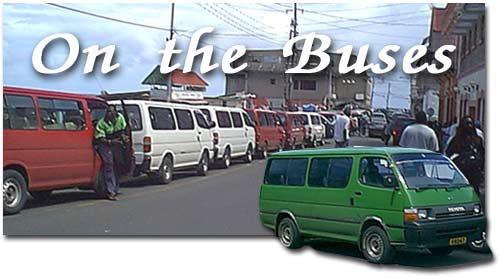In the shade of a schoolhouse porch in the poorest neighborhood in Grenada, I asked an invisible child if he knew who Joseph Kony was. His big, brown eyes looked at me like I was crazy before he said, “Um, no miss.” Then, the serious business of jumping rope quickly continued.
A few days a week you can find me out in a field teaching a forgotten Caribbean kid how to read — or at least how to not steal, do drugs or skip school, as many in this low-income Grenada neighborhood are prone to do. These sweet children don’t know what Facebook is, nor do the posts, reposts and “likes” have much bearing on their lives. They certainly don’t know who Joseph Kony is. A few years from now, that name probably won’t have much bearing on your life either.
If your head hasn’t been in a social media hole, you probably saw some Facebook or Twitter post about this menacing leader of an African rebel group called the Lord’s Resistance Army (LRA). For those who didn’t watch the 30-minute viral video, the man kidnaps young boys and turns them into child soldiers. Don’t worry feminists, he is an equal opportunity bad guy. He’ll take young girls too — for prostitutes.
The video relays tales of kidnap, rape and torture aimed to change the online conversation and start a social revolution.
And just as it came, Kony will disappear from our national consciousness quicker than the recoil from our mouse-clicking trigger fingers.
The man who made this movie, Jason Russell, makes a point that is a little larger than an African conflict. Pay attention, it is a good one. The way we take “action” on important issues is changing and, what’s more, the world is developing a case of self-induced Attention Deficit Disorder (ADD).
A woman much wiser than I once said that after all is said and done, a lot more will be said than done. We are the generation of Facebook revolutionaries, the ones who will change the course of human history with the click of a mouse. After all, Egypt’s iron-fisted president was toppled by social media. Why can’t Kony the warlord be rooted out the same way?
Here’s the major difference: Egyptians walked out the door. Kony’s Facebook fans simply clicked, bought and sat.
It’s not what you say that resonates through the ages. It’s what you do that changes the course of human history.
I look at Grenada’s forgotten children — the destitute, those without shoes on their feet or food to eat — and think how much an online Kony-style campaign would help them.
But really it wouldn’t.
Of course, it would make a lot of money. I have learned that wallets usually melt open when people see the face of a starving or battered child. But what happens when the money runs out? What happens when the child still can’t feed or defend herself when the wallets close back up and the money runs dry? Who is still willing to be there when the next big viral cause comes along?
Public opinion is a fickle mistress. One day you are riding high, the next day you are just another whiner. But personally investing your time, talents and emotions in something, now that’s where real change happens. The course of human history, the rise and fall of dictators or even the safety of a small child pivots on what you are willing to do, not say on Facebook.
Only 5 percent of the world’s population has access to the Internet. So when the Facebook frenzy fizzles and dies for the Kony cause and explodes for another, Grenada’s forgotten children won’t even notice. They will be too busy learning how to read and write and eat and survive. The same is true for the big, brown eyes staring back at us from Uganda, the Congo, Sudan and Darfur. But those children are much worse off.
The idea that we are the generation of Facebook activism is disgusting. The idea that we cannot be the generation of compassionate action is even more chilling.
It does not bode well for the hinge on which human history turns.
Sarah Cooper-Glenn is a journalist from Sparks. She currently lives in Grenada where she is a global politics and travel writer. She can be contacted at sarahglenn2010@gmail.com or via her website, SarahGlenn.Net
Published Tuesday March 13, 2012 in The Daily Sparks Tribune.
